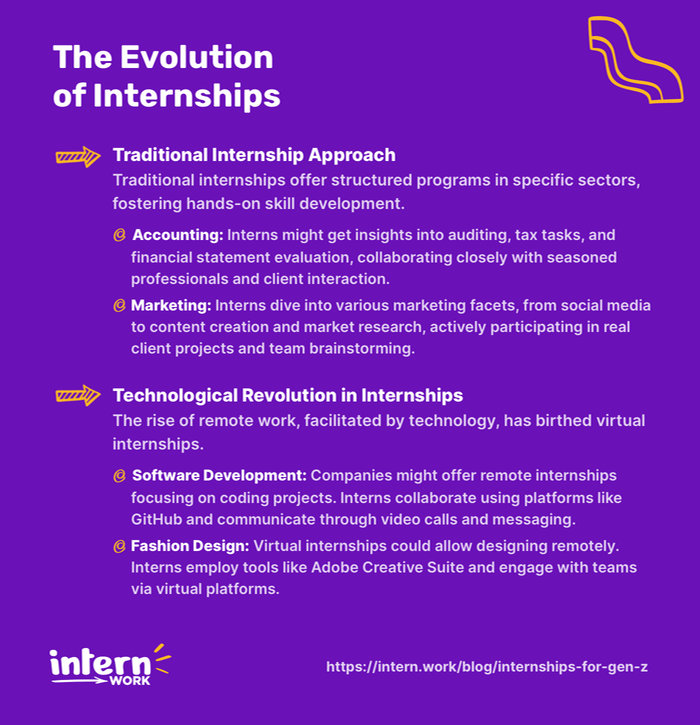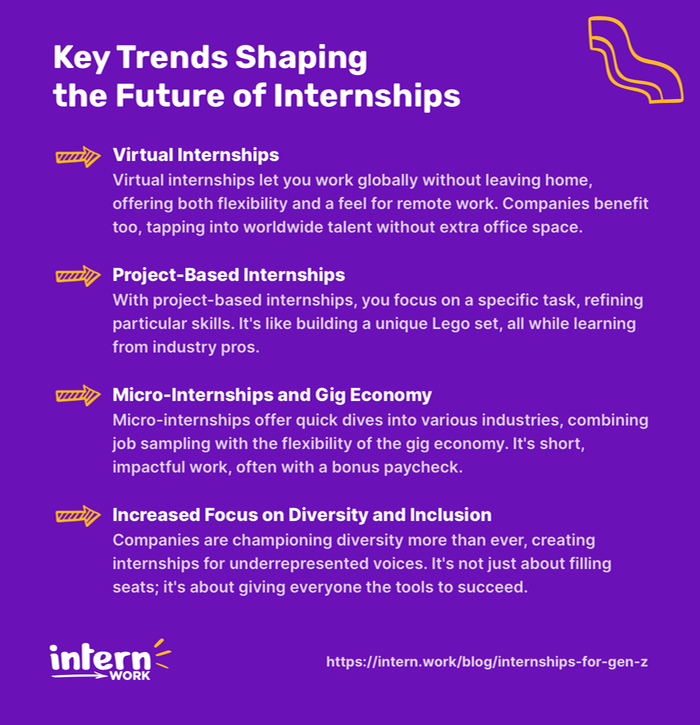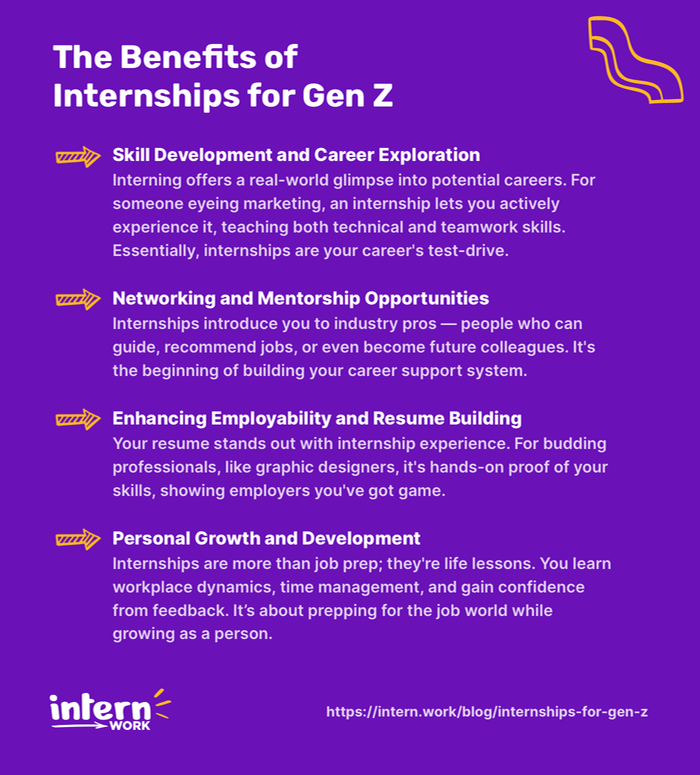
As the workforce continues to evolve, so do the opportunities for internships. With the rise of Gen Z entering the workforce, it’s essential to understand their characteristics and workplace expectations. The traditional model of internships is no longer the only option, as technology and remote work have opened up new doors. Let’s explore the key trends shaping the future of internships and the benefits they offer for Gen Z.
Understanding the Gen Z Workforce
Gen Z, born between 1995 and 2010, is the newest generation to enter the workforce. They are known for their digital savviness, entrepreneurial spirit, and desire for work-life balance. Gen Z is the most diverse generation yet, making up almost half the global population under 30.
Gen Z is a generation of digital natives. They have grown up in a world where technology is integral to their lives. They are comfortable with using technology to communicate, collaborate and work. They are also more likely to use social media platforms like Instagram, Snapchat, and TikTok to connect with their peers and stay up-to-date with the latest trends.
Characteristics of Gen Z
It’s essential to understand the key characteristics of Gen Z, such as their desire for meaningful work, flexibility, and work-life balance. They value diversity and inclusion and have grown up in a world where social media plays a significant role.
Gen Z is a generation that values individuality. They want to be recognized for their unique talents and contributions. They are also more likely to seek work aligning with their values and beliefs. This means they are more likely to work for companies with a solid social or environmental mission.
Gen Z is also a generation that values flexibility. They want control over their work schedules and the ability to work from anywhere. They are more likely to work for companies that offer remote work options, flexible hours, and the ability to work on projects that interest them.
Workplace Expectations and Preferences
Gen Z has a different view of work than previous generations. They prefer open communication, flexibility, and meaningful work that aligns with their values. They also value a healthy work-life balance and the ability to work remotely.
Gen Z is a generation that values collaboration. They want to work in teams and are likelier to seek out companies that foster a collaborative work environment. They also appreciate open communication and want to work for companies encouraging feedback and transparency.
Gen Z is also a generation that values work-life balance. They want to have time for their personal lives and hobbies. They are more likely to work for companies that offer flexible work schedules, unlimited vacation time, and other benefits that promote work-life balance.
Gen Z is a unique generation that brings a new perspective to the workforce. They value flexibility, collaboration, meaningful work, and work-life balance. Employers who understand and adapt to these values are more likely to attract and retain top Gen Z talent.
Gen Z prioritizes open communication, a collaborative work environment, and work-life balance. Understanding and adapting to their preferences is vital to attracting and retaining Gen Z talent in the workforce.
The Evolution of Internships
Internships have come a long way from the traditional model of shadowing an executive. New internship models are emerging with the rise of technology, remote work, and social media.
Traditional Internship Models
Traditional internships typically involve a structured program where interns work in a specific department under the guidance of a supervisor. These internships often focus on skill development and exploration of career options.
For example, an accounting firm may offer an internship program that provides students hands-on experience in auditing, tax preparation, and financial statement analysis. The interns may work closely with experienced professionals in the firm, attend client meetings, and have opportunities to ask questions and receive feedback.
Similarly, a marketing agency may offer an internship program that exposes students to various aspects of marketing, such as social media management, content creation, and market research. The interns may work on real projects for clients, attend brainstorming sessions, and learn from experienced marketers.
The Impact of Technology and Remote Work
Technology and remote work have opened up new opportunities for internships. Virtual internships allow interns to work from anywhere, gaining experience with remote work and digital communication. This model is beneficial in the current global pandemic situation.
For example, a software development company may offer a virtual internship program allowing students to work remotely on coding projects. The interns may communicate with their supervisors and team members through video conferencing and instant messaging and use collaboration tools like GitHub to share their work.
Similarly, a fashion company may offer a virtual internship program allowing students to work remotely on design projects. The interns may communicate with their supervisors and team members through email and virtual meetings and use design tools like Adobe Creative Suite to create their work.
The Role of Social Media in Internship Opportunities
Social media offers a new way to connect with potential employers and find internship opportunities. Platforms like LinkedIn are handy for networking and job searching. In contrast, platforms like Twitter and Instagram can offer insight into company culture and potential internship experiences.
For example, a student interested in a career in public relations may follow PR agencies on Twitter and Instagram to learn about their clients, campaigns, and company culture. They may also connect with PR professionals on LinkedIn and attend virtual networking events to expand their network and learn about internship opportunities.
Similarly, a student interested in a career in technology may follow tech companies on Twitter and Instagram to learn about their products, innovations, and company culture. They may also connect with tech professionals on LinkedIn and attend virtual career fairs to explore internship opportunities.

Internships have evolved with technology and remote work. Traditional programs offer hands-on experience in specific departments, while virtual internships allow remote work and digital communication. Social media platforms like LinkedIn, Twitter, and Instagram connect students with potential employers and provide insights into company culture.
Key Trends Shaping the Future of Internships
Internships have always been an essential part of the professional development of students and young professionals. As the world of work continues to evolve, internships are also changing to keep up with the times. Several key trends are driving the future of internships, including virtual internships, project-based internships, and micro-internships.
Virtual Internships
Virtual internships have become increasingly popular in recent years, especially with the rise of remote work. These internships allow interns to work remotely, gaining valuable experience with digital communication and remote work. This model is not bound by geography and opens up opportunities for global internships. Virtual internships benefit students who cannot travel to a different location for an internship or those who prefer to work from home.
Virtual internships have many benefits for both interns and employers. For interns, they offer flexibility and the opportunity to gain experience in a remote work environment. Virtual internships allow employers to access a wider pool of talent without needing physical office space.
Project-Based Internships
Project-based internships are gaining popularity as they allow interns to work on specific projects and gain experience in a particular area of interest. This model is particularly useful for developing skills and building a portfolio of work. Project-based internships are often more structured than traditional internships and provide a clear focus for the intern’s work.
Project-based internships can be found in various industries, ranging from short-term projects to longer-term assignments. They are particularly useful for students who want to gain experience in a specific area or industry. Project-based internships also allow interns to work closely with professionals and learn from their expertise.
Micro-Internships and Gig Economy
Micro-internships in the gig economy are becoming more popular as they offer short-term, project-based work experience. These opportunities allow interns to gain experience in different industries without committing to a traditional internship model. Micro-internships are often paid and can be completed remotely, making them an attractive option for students who want to earn money while gaining experience.
The gig economy is also changing the way that internships are structured. Companies are increasingly hiring interns for short-term projects rather than long-term assignments. This model allows companies to access a wider pool of talent and provides interns with more flexibility in their work.
Increased Focus on Diversity and Inclusion
As diversity and inclusion become more critical in the workplace, internships are also becoming more focused on these areas. Companies offer targeted internships for underrepresented groups to promote diversity and inclusivity in their organizations. These internships provide opportunities for students who may have yet to have access to traditional internships and help to create a more diverse and inclusive workforce.
Internships focused on diversity and inclusion can be found in various industries, including technology, finance, and healthcare. They often provide additional support and resources for interns, such as mentorship programs and networking events.
Overall, the future of internships is dynamic and evolving. Virtual internships, project-based internships, micro-internships, and internships focused on diversity and inclusion are just a few of the trends shaping the future of internships. As the world of work continues to change, internships will continue to adapt to meet the needs of both students and employers.

Internships are evolving with key trends like virtual, project-based, micro-internships, and diversity-focused internships. These changes cater to remote work, specific skill development, short-term projects, and promoting diversity and inclusion.
The Benefits of Internships for Gen Z
Internships offer numerous benefits for Gen Z, including skill development, career exploration, and networking opportunities. However, the advantages go beyond just these three points.
Skill Development and Career Exploration
Internships provide Gen Z with hands-on experience, allowing them to develop technical and soft skills essential for their career. These experiences enable interns to explore different career paths and industries, giving them a better understanding of what they want to do in the future.
For instance, if a Gen Z student is interested in pursuing a career in marketing, an internship in a marketing firm will give them a chance to learn about different marketing strategies and techniques. They will also get to work on projects and campaigns, which will help them develop skills such as communication, teamwork, and problem-solving.
Networking and Mentorship Opportunities
Internships allow Gen Z to connect with professionals in their industry, building valuable relationships and networking opportunities. Mentors offer guidance and support, helping interns navigate their careers and develop professional networks.
Networking is a crucial aspect of any career, and internships provide a platform for Gen Z to start building their network. They meet people who can offer advice, recommend them for job openings, or even become their future colleagues or employers.
Enhancing Employability and Resume Building
Internships are a valuable addition to a resume, showcasing real-world experience and demonstrating skills to potential employers. They enhance employability, making Gen Z more competitive in the job market.
Moreover, internships also allow Gen Z to build their portfolio. For instance, a graphic design intern can showcase their work in the company’s portfolio or use it as a part of their own portfolio. This will give them an edge over other candidates when applying for jobs in the future.
Personal Growth and Development
Internships also offer personal growth and development opportunities for Gen Z. They experience the real world and learn how to navigate it. They learn about workplace culture, ethics, and professionalism. They also learn about time management, organization, and prioritization, which are essential skills for any career.
Furthermore, internships also help Gen Z build confidence in their abilities. They get to see their work come to life and receive professional feedback. This feedback helps them improve their skills and build confidence in their abilities.
Internships are an excellent way for Gen Z to gain valuable experience, develop skills, and build their network. They offer numerous benefits beyond career exploration, networking, and resume building. Internships are an investment in Gen Z’s future; they should take advantage of these opportunities to grow personally and professionally.

Internships benefit Gen Z through skill development, career exploration, networking, and resume building. They provide hands-on experience, enhance employability, and foster personal growth.
Key Takeaways
- The rise of Gen Z in the workforce has led to changes in the traditional model of internships, with new opportunities emerging due to technology and remote work.
- Gen Z is known for its digital savviness, entrepreneurial spirit, desire for work-life balance, and value for diversity and inclusion. They are comfortable with technology and use social media to connect and stay informed.
- Gen Z prefers meaningful work, flexibility, collaboration, and work-life balance. They value open communication, recognition of their unique talents, and alignment of work with personal values.
- Traditional internships involve structured programs in specific departments, while virtual internships allow for remote work and digital communication. Social media plays a role in finding internship opportunities and connecting with potential employers.
- Key trends shaping the future of internships include virtual internships, project-based internships, micro-internships in the gig economy, and increased focus on diversity and inclusion.
- Internships offer benefits for Gen Z, including skill development, career exploration, networking, mentorship opportunities, enhancing employability, resume building, and personal growth and development.
- Internships are an investment in Gen Z's future, providing them with real-world experience, valuable skills, and the opportunity to build their professional network.
Wrapping Up
The future of internships is exciting, with new opportunities emerging for Gen Z. Companies are changing their internship models to adapt to the changing workforce and offer more meaningful experiences. For Gen Z, internships provide invaluable benefits, including skill development, career exploration, and networking opportunities. As technology and society evolve, internships will remain a critical element in shaping the future of work.






